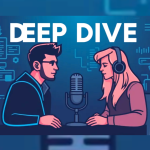
Today's Deep-Dive: Nightmare before christmas - the happy holiday edition
This episode celebrates the holiday season by exploring the themes of “The Nightmare Before Christmas.” It highlights the journey of Jack Skellington, the Pumpkin King of Halloween Town, who, despite his success, feels a sense of emptiness. His curiosity leads him to Christmas Town, where he becomes obsessed with the holiday spirit, yet struggles to convey its essence to his Halloween-themed community. This clash of perspectives results in chaotic attempts to take over Christmas, ultimately leading to misunderstandings and mishaps. Sally, a character with foresight, tries to warn Jack of impending disaster but is ignored, showcasing the importance of listening to voices of reason. As Jack’s plans unravel, he learns valuable lessons about identity, responsibility, and the consequences of his actions. In the end, he redeems himself by rescuing Santa and embracing his true role in Halloween Town, while also acknowledging his feelings for Sally. The story emphasizes the significance of finding joy in unexpected places and staying true to oneself. The page concludes with holiday wishes and a reminder of the upcoming break and future content.